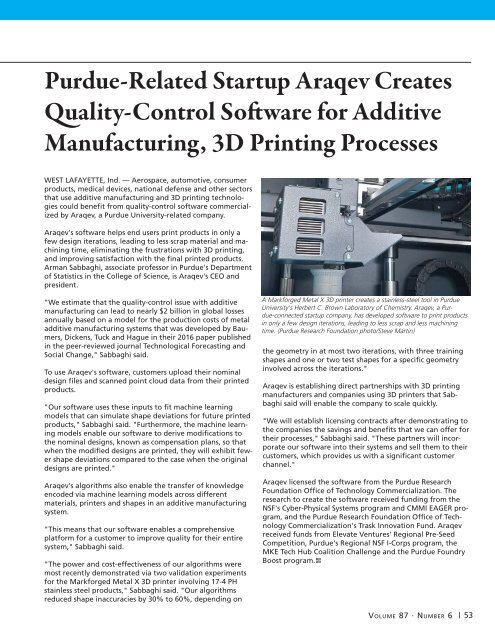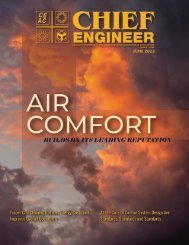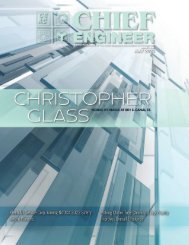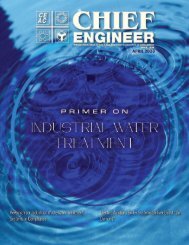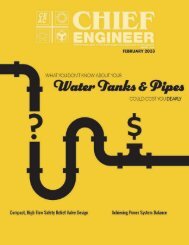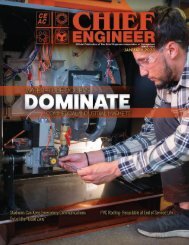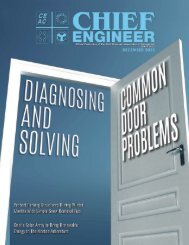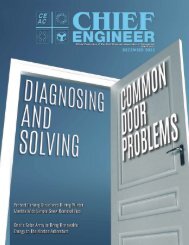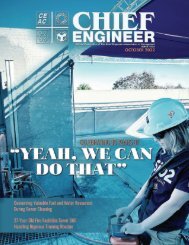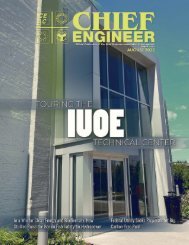CEAC-2022-06-June
You also want an ePaper? Increase the reach of your titles
YUMPU automatically turns print PDFs into web optimized ePapers that Google loves.
Purdue-Related Startup Araqev Creates<br />
Quality-Control Software for Additive<br />
Manufacturing, 3D Printing Processes<br />
WEST LAFAYETTE, Ind. — Aerospace, automotive, consumer<br />
products, medical devices, national defense and other sectors<br />
that use additive manufacturing and 3D printing technologies<br />
could benefit from quality-control software commercialized<br />
by Araqev, a Purdue University-related company.<br />
Araqev's software helps end users print products in only a<br />
few design iterations, leading to less scrap material and machining<br />
time, eliminating the frustrations with 3D printing,<br />
and improving satisfaction with the final printed products.<br />
Arman Sabbaghi, associate professor in Purdue's Department<br />
of Statistics in the College of Science, is Araqev's CEO and<br />
president.<br />
"We estimate that the quality-control issue with additive<br />
manufacturing can lead to nearly $2 billion in global losses<br />
annually based on a model for the production costs of metal<br />
additive manufacturing systems that was developed by Baumers,<br />
Dickens, Tuck and Hague in their 2016 paper published<br />
in the peer-reviewed journal Technological Forecasting and<br />
Social Change," Sabbaghi said.<br />
To use Araqev's software, customers upload their nominal<br />
design files and scanned point cloud data from their printed<br />
products.<br />
"Our software uses these inputs to fit machine learning<br />
models that can simulate shape deviations for future printed<br />
products," Sabbaghi said. "Furthermore, the machine learning<br />
models enable our software to derive modifications to<br />
the nominal designs, known as compensation plans, so that<br />
when the modified designs are printed, they will exhibit fewer<br />
shape deviations compared to the case when the original<br />
designs are printed."<br />
Araqev's algorithms also enable the transfer of knowledge<br />
encoded via machine learning models across different<br />
materials, printers and shapes in an additive manufacturing<br />
system.<br />
"This means that our software enables a comprehensive<br />
platform for a customer to improve quality for their entire<br />
system," Sabbaghi said.<br />
"The power and cost-effectiveness of our algorithms were<br />
most recently demonstrated via two validation experiments<br />
for the Markforged Metal X 3D printer involving 17-4 PH<br />
stainless steel products," Sabbaghi said. "Our algorithms<br />
reduced shape inaccuracies by 30% to 60%, depending on<br />
A Markforged Metal X 3D printer creates a stainless-steel tool in Purdue<br />
University's Herbert C. Brown Laboratory of Chemistry. Araqev, a Purdue-connected<br />
startup company, has developed software to print products<br />
in only a few design iterations, leading to less scrap and less machining<br />
time. (Purdue Research Foundation photo/Steve Martin)<br />
the geometry in at most two iterations, with three training<br />
shapes and one or two test shapes for a specific geometry<br />
involved across the iterations."<br />
Araqev is establishing direct partnerships with 3D printing<br />
manufacturers and companies using 3D printers that Sabbaghi<br />
said will enable the company to scale quickly.<br />
"We will establish licensing contracts after demonstrating to<br />
the companies the savings and benefits that we can offer for<br />
their processes," Sabbaghi said. "These partners will incorporate<br />
our software into their systems and sell them to their<br />
customers, which provides us with a significant customer<br />
channel."<br />
Araqev licensed the software from the Purdue Research<br />
Foundation Office of Technology Commercialization. The<br />
research to create the software received funding from the<br />
NSF's Cyber-Physical Systems program and CMMI EAGER program,<br />
and the Purdue Research Foundation Office of Technology<br />
Commercialization's Trask Innovation Fund. Araqev<br />
received funds from Elevate Ventures' Regional Pre-Seed<br />
Competition, Purdue's Regional NSF I-Corps program, the<br />
MKE Tech Hub Coalition Challenge and the Purdue Foundry<br />
Boost program.<br />
Volume 87 · Number 6 | 53


